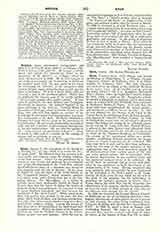

Ryan, ABRAM J., the poet-priest of the South, b. at Norfolk, Va., August 15, 1839; d. at Louisville, Ky., April 22, 1886. He inherited from his parents, in its most poetic and religious form, the strange witchery of the Irish temper. Fitted for the priesthood by a nature at once mystic and spiritual, he was ordained just before the beginning of the Civil War, entered the Confederate army as a chaplain, and served in this capacity until the end of the war. In the hour of defeat he won the heart of the entire South by his “Conquered Banner,” whose exquisite measure was taken, as he told a friend, from one of the Gregorian hymns. The Marseillaise, as a hymn of victory, never more profoundly stirred the heart of France than did this hymn of defeat the hearts of those to whom it was addressed. It was read or sung in every Southern household, and thus became the apotheosis of the “Lost Cause“. While much of his later war poetry was notable in its time, his first effort, which fixed his fame, was his finest production. The only other themes upon which he sang were those inspired by religious feeling. Among his poems of that class are to be found bits of the most weird and exquisite imagery. Within the limits of the Southern Confederacy and the Catholic Church in the United States, no poet was more popular. After the war he exercised the ministry in New Orleans, and was editor of “The Star,” a Catholic weekly; later he founded “The Banner of the South” in Augusta, Ga., a religious and political weekly; then he retired to Mobile. In 1880 he lectured in several Northern cities. As a pulpit orator and lecturer, he was always interesting and occasionally brilliant. As a man he had a subtle, fascinating nature, full of magnetism when he saw fit to exert it; as a priest, he was full of tenderness, gentleness, and courage. In the midst of pestilence he had no fear of death or disease. Even when he was young his feeble body gave him the appearance of age, and with all this there was the dreamy mysticism of the poet so manifest in the flesh as to impart to his personality something which marked him off from all other men. His “Poems, Patriotic, Religious, and Miscellaneous” have reached a twenty-fourth edition.
HANNIS TAYLOR

